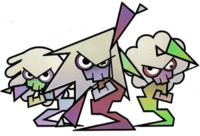Three hags
| Three hags | |
|---|---|

| |
| Full name | Hagnes, Hagra, and Hagitha |
| First appearance | Super Paper Mario (2007) |
The three hags are characters from Super Paper Mario that are found in the Underwhere Road behind a couple of pink doors with a heart on each of them. Their names are Hagra, Hagitha, and Hagnes. They are based on the three Moirai, or the Fates, in Greek mythology. They all have a favor to ask the player, but only Hagra's is required; the other two are optional.
Favors
- Hagra will ask the player to get her Diet Book from a D-Man and sends the player to him, as the player earns a reward, it will be the Door Key.
- Hagitha will send the player on a similar quest. She sends the player to ask a D-man to record a show for her. She will also tell the player a strategy to defeating the Underchomp: it falls asleep when playing music near it (which is a hint that the player should use Piccolo the Pixl).
- Hagnes' request is to listen to her talk for a while. She will tell the player a long-winded love story from her past (similar to Merlumina, though Mario does not fall asleep), revealing that as a youth, she competed with a rival for Grambi's affections, only to lose him to the other woman, Jaydes. The reward is a thank you.
Complaints
Each of the hags, if the player refuses the favor, will give a long, ranting speech railing against the younger generation, similar to Koopa Koot from Paper Mario. Hagra and Hagitha's speeches are identical until they get to what they blame; Hagra blames video games, claiming that simulated worlds drain away a person's ability to relate to real people, while Hagitha blames cellular phones, reasoning that being able to chat long-distance makes one uncomfortable with talking face to face. Hagnes, however, takes a comical turn when she realizes that when she was a young person, she was just as bad, giving her elders "nothing but grief".
Names in other languages
Three hags
| Language | Name | Meaning | Notes |
|---|---|---|---|
| Japanese | アンダーランド三姉妹[?] Andārando San-shimai |
The Underwhere's Three Sisters | |
| French | Les trois Mégères[?] | The three hags | |
| Italian | Tre anziane sorelle[?] | Three old sisters | |
| Spanish | Tres hermanas ancianas[?] | Three old sisters |
Hagra
| Language | Name | Meaning | Notes |
|---|---|---|---|
| Japanese | ババーラ[?] Babāra |
Likely derived from「婆」(babā, old woman) and the female name "Barbara"; shared with Nana | |
| French | Mégèra[?] | ? | |
| German | Hagra[?] | - | |
| Italian | Megera[?] | Hag | |
| Spanish | Nadine[?] | ? |
Hagitha
| Language | Name | Meaning | Notes |
|---|---|---|---|
| Japanese | ババーヤ[?] Babāya |
Likely derived from「婆」(babā, old woman) and name ending「や」(-ya) | |
| French | Mégèrine[?] | ? | |
| German | Hagitha[?] | - | |
| Italian | Megerina[?] | Hag-ina | |
| Spanish | Sabine[?] | ? |
Hagnes
| Language | Name | Meaning | Notes |
|---|---|---|---|
| Japanese | ババーナ[?] Babāna |
Likely derived from「婆」(babā, old woman) and feminine suffix「な」(na) | |
| French | Mégèrelle[?] | ? | |
| German | Hagzissa[?] | ? | |
| Italian | Megerella[?] | Hag-ella | |
| Spanish | Celine[?] | ? |